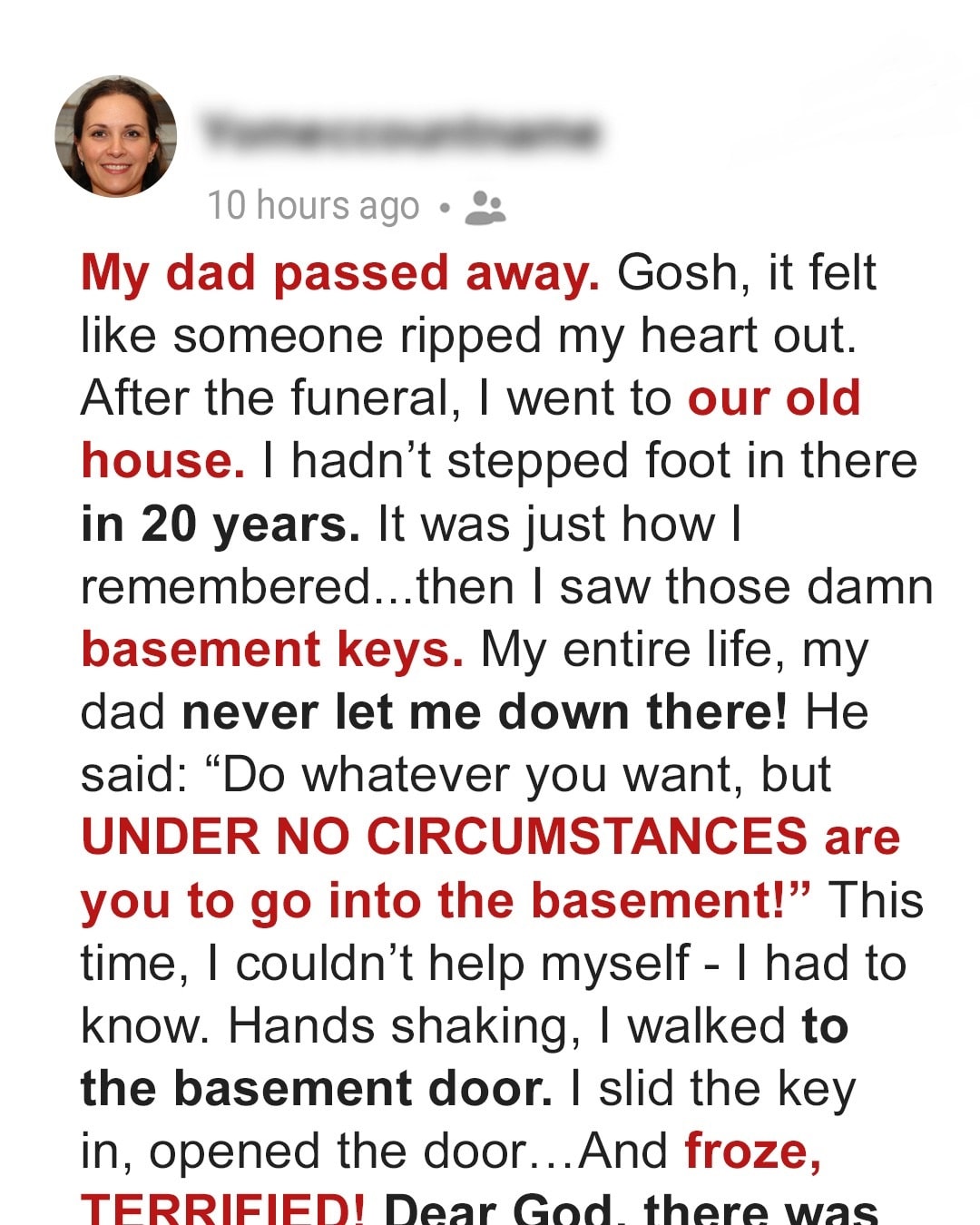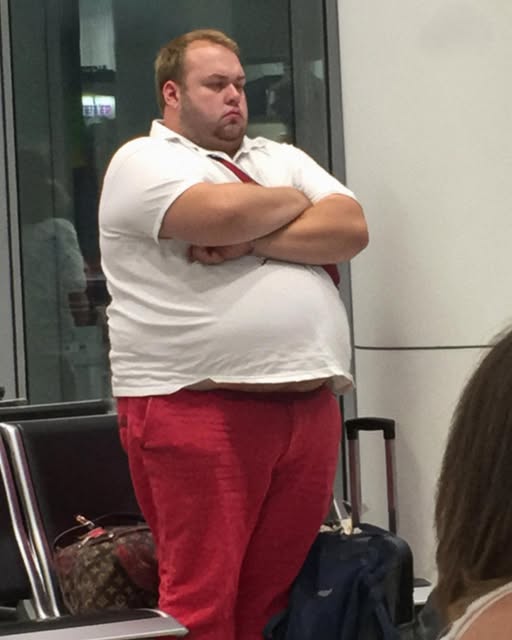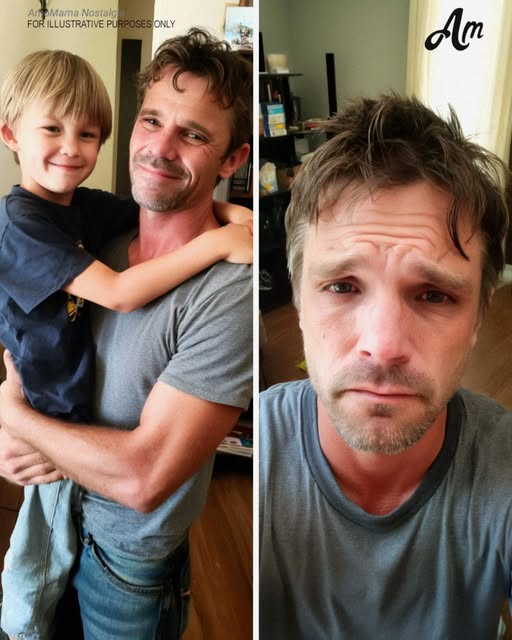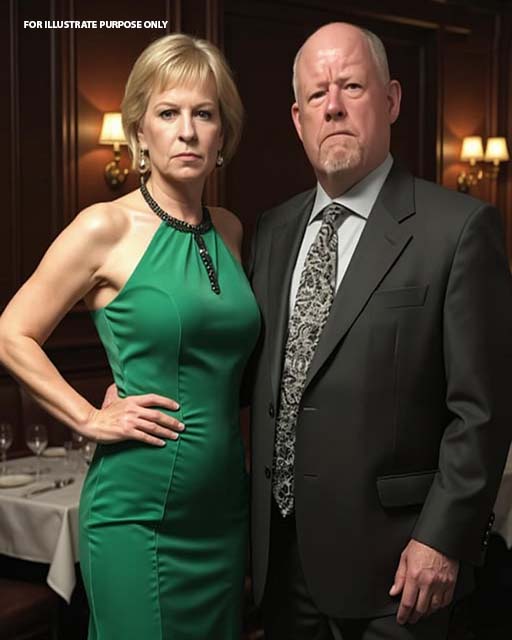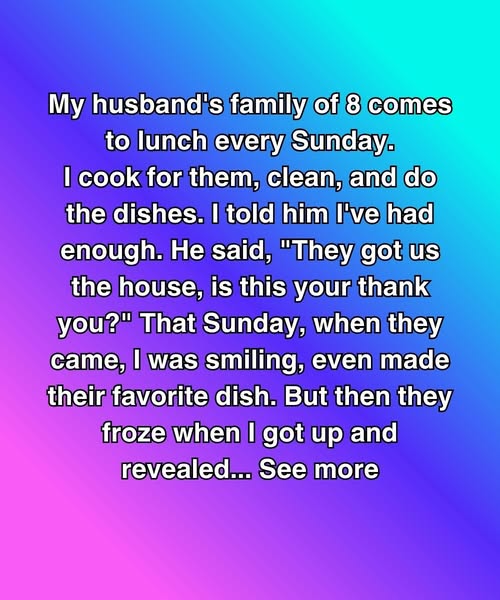I hadn’t stepped inside my childhood home in twenty years. After the funeral, the air still smelled like his aftershave and old books, like time had politely refused to move on. I told myself I’d just grab a few keepsakes and go.
Then I saw the basement keys.
Growing up, that door was the one hard rule. “Do whatever you want,” Dad would say, “but under no circumstances do you go into the basement.” It was the kind of command that turns into a myth inside a kid’s head. Monsters. Lab. Secret tunnel. Who knows.
My hands were shaking as I slid the key in. The lock clicked, the door swung, and I froze on the threshold.
It wasn’t a storage cave. It was a hidden life. A finished space—bed made tight, desk lined with pens, shelves of books that climbed the walls. The air was a mix of dust, cologne, and something softer I can only call memory. I pulled the chain on a lamp and a warm, honey light spilled across medical journals, psychology texts, and a few photo albums wedged between.
On the desk sat a leather notebook. My name was embossed on the front.
Seeing his handwriting again knocked the wind out of me. I opened it and fell into him—pages and pages about me, from birth through high school. Allergies. The time I broke my arm. That I hated thunderstorms. He described my kindergarten drawings like he was cataloging a museum. It was tender, obsessive, and… something else.
A line stopped me cold.
“March 8, 2004: Today, we got the letter. Custody is final. She’s not coming back. I don’t care what her lawyer says. This is our home now. I won’t let her take him from me again.”
I’d grown up believing my mother left because she didn’t want me. Dad never badmouthed her—he just said she was “unwell” and “it’s better this way.” I kept reading.
“I think he’s starting to remember the visits. I told him it was a dream.”
“She called the house again. I told her if she tried that again, I’d get a restraining order.”
“He asked about the scar again. I told him he fell off the swing. He didn’t look convinced.”
My stomach flipped. At the back was an envelope taped to the last page—my name in all caps.
“Mateo—
If you’re reading this, I’m gone. I know you opened that basement door. I never meant to scare you—I just didn’t know how to tell you the truth.
Your mother didn’t abandon you. I lied. I kept her away. I told the courts things that weren’t entirely true. I panicked. I couldn’t bear losing you too.
She loved you. Maybe she still does. There’s an address in the back cover. If you want her side, that’s where you’ll find her.
Love,
Dad.”
I stared at the Portland address until it blurred. Then I packed a bag.
Two days later I was standing on a porch beneath wind chimes and wildflowers. The door opened and a woman with my eyes looked at me like she’d practiced hope every day for twenty years.
“Mateo?” she said.
I nodded. My throat didn’t work.
We sat for hours. She told me about the court case, the depression she’d fought, the therapy, how Dad had painted her as dangerous. She owned the parts she got wrong and swore she never stopped loving me. I believed her. Not because I wanted to, but because the shape of her truth matched the edges of my questions.
A week passed like an exhale I’d been holding since childhood. We walked in the park. We looked through old photos. She showed me thirty birthday cards she’d written and never mailed—each one addressed to me.
Eventually I flew back to San Antonio, but everything was different. A month later I invited her to the old house. We cleared the basement together, and she found a wooden box tucked under the bed.
Inside were original court documents—letters from her lawyer about missed visitations, proof a restraining order had been denied, not granted. “I never saw these,” she whispered. “He told the courts I refused contact.”
I didn’t feel rage so much as vertigo. My father had been both caretaker and gatekeeper; my mother, both flawed and shut out. Two people doing their best in broken ways. The box didn’t fix anything, but it gave the past edges. Closure isn’t a slam of a door—it’s the quiet click when something finally makes sense.
I started therapy—not because I was falling apart, but because I wanted to put myself together on purpose. I wrote, at first in scraps, then in essays. A local paper published one: “The Room Below the House.” Emails arrived from strangers who’d opened their own metaphorical basements—people who’d been lied to, who’d reconnected, who decided to look.
One message read: “Your story made me brave enough to turn the key.” That’s when the ache began to feel like a tool.
A year later I sold the house. Before I handed over the keys, I stood by the basement door, pressed my palm to the knob, and whispered, “Thank you, Dad. I get it now.” Then I closed it gently.
I live in Portland now, a few blocks from my mom. We eat together on Sundays. She still pulls out photos like a ritual. We are not pretending the past didn’t happen. We’re letting the truth sit with us while we move forward anyway.
If there’s a door in your life you’ve been afraid to open, consider this your nudge. You might not like everything you find. But you might finally understand why it was locked. And sometimes, that’s the beginning of healing.
If this found you at the right time, give it a share or a like. Someone out there is standing with a key in their hand, waiting for a sign.
